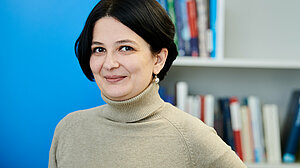Diana Bogishvili: "The pandemic has limited my access to the field"

Which countries and which topic does your current research focus on?
For my PhD project, I am investigating social remittances and their possible impacts on forms of social inequality in the country of origin, with reference to Georgian migrants in Germany. Migrant remittances are reshaped in the context of cross-border relations and influence individuals’ behaviour, identity, belonging, mobility and networks in places of origin and destinations. In my research, I focus generally on the interaction between the host and the sending country; I do this by conducting surveys among Georgian migrants in Germany and their families in Georgia.
What impact does the pandemic currently have on your work?
The pandemic has limited my access to the field. My main interest is in showing how people experience the everyday in their lifeworlds. The research involves entering into a direct process of communication with people as they go about their daily lives. The continuous and direct experience of the field informs my data-gathering. However, due to the limits on personal contact imposed in response to the coronavirus, I had to postpone all my planned interviews in Germany and cancel my field trip to Georgia scheduled for April to June.
How has Covid-19 influenced your research topic / the objective of your research?
Before the lockdown, my interview partners were telling me about the important role that mobility plays in their lives. They compared it metaphorically to freedom, which they defined as an ongoing “search for the new”. For migrants, this word “new” has three dimensions: a new environment, new people and new experiences. By limiting mobility, the pandemic has also confined this “search for the new”. This new set of circumstances inspired me to ask a new set of questions. I began to conduct regular online surveys among my interview partners in order to show how the context – namely the current social crisis caused by the coronavirus – affects Georgian migrants’ subjective individual worlds and their happenings. The following questions were of particular interest: How has the coronavirus crisis changed migrants’ everyday normality? And what effect does this restricted mobility have on their cross-border social relations?
In your view, what are the most important long-term effects of Covid-19 in your region?
There are two stages to the coronavirus crisis. Firstly, there is the damage to health, and secondly, there is the economic impact, which we will see later. The economic and social impacts are likely to be severe, especially in poor countries, and may well cause more harm than the virus itself.
The coronavirus crisis has hit tourism in Georgia very hard. Air travel has been suspended. Around 70% of total trade in Georgia comes from imports. If this trend continues, it will have a negative impact on the Georgian economy over the long term. The devaluation of the national currency is also a major problem. In order to control the virus, Georgia closed its borders and imposed restrictions on imports. External trade has also suffered as a result of the crisis. Remittances from migrants are another key source of income for Georgia, as well as being a potential driver of economic development, amounting to almost 13.5% of gross domestic product. According to the National Bank of Georgia, the value of remittances from other countries to Georgia has halved since March 2020.
Reduced imports and exports, the inevitable surge in unemployment, rising poverty, the pressure on the national currency from various sources, the drop in tourism and the decrease in international remittances – these are already the visible economic impacts of the coronavirus in Georgia.
Looking at the social sciences / your discipline, how will the experience of the pandemic change how research is done in general?
The common feature of every crisis to date is that they were all very hard to imagine beforehand. Each one brings new social and political challenges that require appropriate decision-making to resolve. Science and research also face the challenge of always having to respond to crises. I believe that the academic community should make an effort to align its research questions and concepts to the specific challenges faced by society.
Sociologist Diana Bogishvili is a researcher at ZOiS Berlin and a doctoral student at Berlin Graduate School of Social Sciences at Humboldt-Universität zu Berlin.